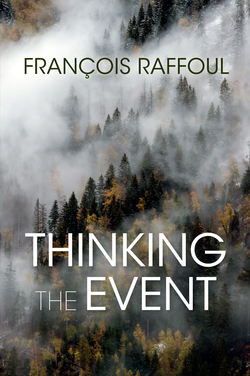Thinking the Event

Реклама. ООО «ЛитРес», ИНН: 7719571260.
Оглавление
François Raffoul. Thinking the Event
Отрывок из книги
THINKING THE EVENT
John Sallis, editor
.....
I pursue in chapter 2 this emergence of the event outside of the dominance of causality and subjectivity by showing how for both Nietzsche and Heidegger, the event escapes the schemes of causality, subject or substrate, and reason. Two fundamental errors stand in the way of letting the event come forth in its eventfulness: the reliance on causality and the belief in the subject. With respect to causality, instead of the event following the cause, I suggest that the event is the original phenomenon. Events do not simply follow predetermined sequences. An event “worthy of the name” represents the surge of the new through which precisely it does not “follow” from a previous cause. A new understanding of temporality is here required: not a ruled sequence coming from the past to the present, but an eventful temporality, coming from the future, disrupting the causal networks, and transforming the entire complex of temporality, indeed transforming the past itself. Another conception of the event is called for, no longer anchored in a cause-substrate, but happening without ground.
This groundlessness of the event is revealed by Heidegger in his course, The Principle of Reason, in which he reflects on a principle that is precisely supposed to ground events: the principle of reason (der Satz vom Grund). As noted, it is paradoxically the very claim of the principle of reason, that is, that all events must be founded in reason, that turns out to be itself without reason and thus groundless. An abyss is here formed, which is the abyss (Ab-grund) of the ground that, in order to be the ground, must itself be without a ground. To the question of “why,” which asks for reasons and foundations, Heidegger opposes the “answer” of the because through his citing of the sixteenth-century poet and mystic Angelus Silesius:
.....